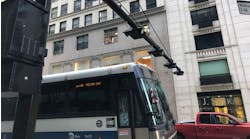TriMet’s Board of Directors on Sept. 16, approved an increase in the payroll and self-employment tax rate with revenues dedicated to new and improved service. Beginning Jan. 1, the employer tax rate will increase by 1/10th of 1 percent phased-in over 10 years. The rate will change from 0.7237 to 0.8237 percent. The employer payroll tax funds about 59 percent of transit operations.
TriMet’s 20-year vision for the future of transit in our growing region
The demand for transit is growing as the region’s economy recovers and as the region grows. Estimates project an expected equivalent of four new Hillsboros with 400,000 new residents and 260,000 new jobs by 2035. In order to stay ahead of growth and ease congestion, TriMet needs to expand transit service.
Board president Bruce Warner said, “TriMet has worked hard over the past several years to put itself on solid financial footing for the long-term, and along with the improved economy, must now focus on expanding service to improve access to jobs, education and give people a convenient alternative to driving.”
New revenues dedicated to more and better service
The additional revenue will be dedicated to new and expanded bus, rail and innovative community and job connector services that are outlined in the agency’s comprehensive strategic Service Enhancement Plans (SEPs). The SEPs are 20-year visions for the future of transit that were created after meeting with key stakeholders, businesses, residents and riders over the past four years.
The SEPs map out improvements in every neighborhood in the region: Westside,Southwest, Eastside, North/Central and Southeast sectors. Here’s a sampling of ideas for expanding service in each of the SEP sectors:
- More frequent bus service, including new Frequent Service lines on 122nd Ave, 181st/182nd Aves in Rockwood, and between Beaverton, Orenco and Hillsboro
- Bus Rapid Transit on Powell/Division between downtown Portland/SE Portland and Gresham/Mt. Hood Community College
- Extending MAX Red Line service from Beaverton to Hillsboro, providing direct service to PDX
- New bus lines and more connections to more places, such as new lines on NE/SE 162nd, between Sherwood and Tualatin, and between Gresham and Troutdale Reynolds Industrial Park, connecting SE Portland to the Columbia Corridor.
- Innovative community and job connectors in suburban and employment areas to address the “last mile” connection issue. These programs have been successful in Forest Grove and Tualatin and the SEP calls for examining added shuttles in areas such as North Hillsboro, Rivergate, East Columbia Corridor, Clackamas Industrial area and Cedar Mill/Northwest Heights areas.
Next steps
The new revenues will bring in $4.3 million in year one and about $43 million in year 10 (in current dollars). The first service expansions are scheduled to begin in September 2016. Over the next year, TriMet will conduct research and meet with community interests to determine which bus service expansions will best improve access to jobs, education and other community services. This includes employment shifts and connections with other transit service. TriMet will continue to work with employers and the community to prioritize service expansions over the next 10 years.
The ordinance approved by the board also calls for a review of revenues and needs after the first five years. If revenues materially exceed the annual amounts necessary to expand service to meet state and regional plan requirements and maintain sufficient financial reserves, the Board will defer the payroll tax increase for the subsequent year.
Transit is part of the solution
The 2014 Portland Business Alliance cost of congestion study shows that the growth in jobs and residents means more travel, more freight, more demands on the existing transportation system and more congestion. It found that investing in transit and roads would reduce that impact by almost half, while generating nearly $1.1 billion in economic benefits and more than 8,300 more jobs per year by 2040. That means for every $1 spent on roads and transit, there’s a return of $2.40.
The 2009 Oregon Legislature gave TriMet the authority to increase the employer payroll tax rate by 1/10th of 1 percent phased-in over 10 years. TriMet did not take action to increase the employer tax rate due to the Great Recession, and the need for the agency to realign its cost of benefits and wages to be more efficient with its revenues. With internal efficiencies and changes to benefits and wages, TriMet is now on a sustainable financial path for the long-term and focused on improving service to meet demand while helping to ease congestion.
